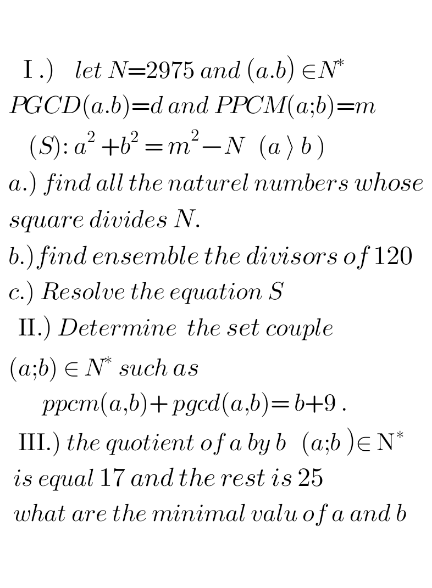
Question and Answers Forum
Number TheoryQuestion and Answers: Page 6






|
Question and Answers Forum |
Number TheoryQuestion and Answers: Page 6 |
| −−−−−−−−− 1!−2!+3!−4!+5!−…−14!+15!=? −−−−−−−−−−by M.A |
| x^n =n^x x=? |

|

|
| ∫_0 ^2 f(x)dx⋍f(a)+f(2−a) For what values of a is the following formula accurate for polynomials of degree 3? |

|

|
| determinant ((( determinant ((( x+y+x^2 y^2 =586_(x=?,y=? ) ^(x,y∈Z ) )))_ ^ _() ^(•) ))) |
| Simplify ((1^2 ∙2!+2^2 ∙3!+3^2 ∙4!+∙∙∙+n^2 (n+1)!−2)/((n+1)!)) to n^2 +n−2 |
| Q#161744 reposted with some change. Solve for integer numbers: (x/y) + (5/x) + ((y - 5)/5) = ((y + x)/(y + 5)) + ((5 + y)/(5 + x)) |
| Σ_(n=1) ^∞ (((−1)^(n+1) )/(n(2n+1)))=? |
| PROVE that the numbers of types 4k+2 & 4k+3 are NOT perfect □s. |

|
| Find out some pairs (a,b) such that for some n≥1 a^n +b^n ,a^(2n) +b^(2n) ,a^(4n) +b^(4n) ,a^(8n) +b^(8n) ∈P |
| Find out pairs of numbers (a,b) (as many as you can) such that: (√a) +(√b) , a+b , a^2 +b^2 ∈ P |
| Π_(n=1) ^∞ ((α^3 +β^2 )/3^n )= ? in expanded form |
| ≺PRIME-BIRTHDAYS≻ Do you know ′Prime1611′?... No,no it′s not an ID of the forum- member.It is a person who was born on November 16, 0001.On his birthday astrologers formed a string from his birthdate in the way: ′ddmmyyyy′: ′16110001′ The astro- logers observed that number containing in the string: 16110001 is a prime number.Thus they gave him name ′Prime1611′ They also suggested that Mr Prime1611 should celebrate his birthday only when the number ddmmyyyy be prime number.Recently He celebrated his birthday on 16-11-2021 as the number 16112021 is prime. How many birthdays has he celebrated upto his recent birthday when he had celebrated his first birthday on 16-11-0001? You may use calculator also. Question connected with Q#159421 |
| Σ_(n=0) ^∞ (1/((3n+1)^3 ))=? |
| 82,1336,18670,240004,2933338,34666672,400000006,? is there a valid pattern for these numbers? |

|
| Σ_(0<n) (((−1)^(n−1) n)/(sinh(πn)))=(1/(4π)) prove |
| x is positive integer number can you check if Q=((((x+2)^4 −x^4 ))^(1/3) is a natural number |
| cos(π/5)=...? with solution pls |
| A=[((x^n ((x^n^2 ((x^n^3 ∙∙∙∙(x^n^n )^(1/n) ))^(1/n) ))^(1/n) ))^(1/n) ]^(1/n) |
| Find the cube root of one .Hence show that the sum of the root is equal to zero |